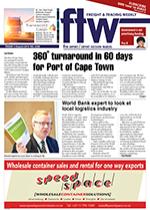Ongoing concerns with the customs scanner at the Port of Cape Town, which has seen importers’ costs escalate, have led to industry’s decision to take the matter to the provincial red tape department. According to a spokesman for the Cape’s Port Liaison Forum (PLF), the issue around the scanner is a classic example of red tape that is effectively costing importers thousands of rands. “The scanning of a container can cost an importer anything from R10 000 to R20 000,” he said. “What makes it worse is that the challenge faced at present with the scanner was already highlighted to officials prior to its installation in 2015.” Carrier haulage remains the biggest bone of contention. Containers by law have to be transported by shipping lines until released by Customs. Industry has time and again raised concern over the inflated costs for the movement of containers by shipping lines to and from the scanner, as well as the inability to change hauliers once the container has been cleared at the scanner. If the container is on the wrong truck once it has been cleared at the scanner, “either the importer uses the shipping line to transport the container to the final destination, which is usually at a much higher rate than the average transporter would charge, or the container has to be moved to a depot where it can be picked up by another transporter,” explained the spokesman. “All of this means increased costs. If the scanner is not released it still has to be taken to the depot where it can be physically inspected.” Calls for Transnet Port Terminals (TPT) to move the containers to and from the scanner and back to the stack have been unsuccessful. “TPT is the only other entity allowed to transport uncleared containers and the transport costs would immediately be less. “Taking the boxes back to the stack would also cut out the extra depot charges,” said the spokesman, who indicated they had asked TPT to make a decision on the matter and take over the movement of containers to the stack. TPT, however, has said it is unable to move the containers. “Legally we are restricted to do it. By law we would have to be instructed by the shipping line to move the container on their behalf. Also, only once that instruction has been received will TPT be able to do a risk assessment and decide if it was in a position to take on this role,” a spokesman told FTW. “No shipping line has requested TPT to move containers to and from the scanner.” In an effort to address the escalating cost and ongoing challenge, the PLF is in the process of drafting an official letter to the province's MEC for economic opportunities, Alan Winde, requesting that the red tape reduction unit look into the matter. “It is simply not feasible or sustainable for an importer to pay up to R20 000 just to have a container scanned,” said the spokesman. “As an industry, we have to collectively come up with a solution for this ongoing problem.”
INSERT
It's simply not feasible or sustainable for an importer to pay up to R20 000 just to have a container scanned. – PLF

